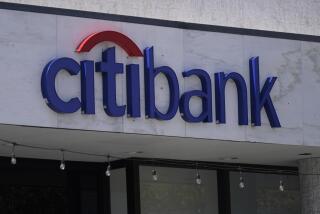Advocacy group protests CIT Group deal for OneWest Bank
National business banking lender CIT Group Inc. stands to collect more than $1.4 billion from federal regulators to cover future losses should its purchase of OneWest Bank in Pasadena be approved.
News of the loss coverage, part of a Freedom of Information Act disclosure obtained by the California Reinvestment Coalition, has enraged the public advocacy group as one more major government subsidy in a deal that also is enriching billionaires and top OneWest managers.
“This new information confirms that this proposed deal would be subsidized by the government to the tune of nearly $5 billion,” said Kevin Stein, the coalition’s associate director.
Particularly galling to the coalition is that CIT never repaid $2.3 billion in taxpayer bailout funds during the Great Recession, getting the debt wiped out in bankruptcy.
The figures on loss-sharing payments were unreported previously. The coalition, an advocate for the poor, has been a leader of several dozen groups protesting the merger. They plan to picket Tuesday at OneWest headquarters.
The protesters want the Federal Reserve to delay the New York firm’s planned $3.4-billion acquisition of OneWest, announced in July, and to schedule public hearings on the transaction.
CIT is reaping a major benefit from a 2009 agreement that several billionaires struck with the Federal Deposit Insurance Corp. to create OneWest from the remains of IndyMac Bancorp, the maker of high-risk mortgages that collapsed during the financial crisis.
Under that deal, the FDIC agreed to share the losses from bad IndyMac loans, paying more than $2.4 billion over time. So far, the regulator has paid more than $1 billion in loss-sharing payments to OneWest, the coalition said, and the terms allow continued payments to a buyer like CIT.
Stein calculated government support for the deal by adding the roughly $2.5 billion in total loss-share payments to the bailout funds from the Troubled Asset Relief Program that went unpaid after CIT filed for bankruptcy in 2009.
The advocacy groups contend that to satisfy requirements of the Community Reinvestment Act of 1977, the financial firms should produce a finely detailed plan to support lower-income areas through increased lending and other services.
Stein said only two of OneWest’s 73 branches are in low-income areas, and its small-business loans include very few to businesses with annual revenue of less than $1 million — the types of businesses common in minority neighborhoods.
“We see the public subsidy and the private gain in this merger — but not the public benefit,” Stein said.
CIT and OneWest officials didn’t immediately respond to requests for comment Monday.
In a Community Reinvestment Act plan released in October, they said the merged banking operation, to be called CIT Bank, would establish a community advisory board to help it craft CRA plans in OneWest’s area of operations, which stretches from Ventura south to San Diego and east to Riverside and San Bernardino.
Unlike OneWest, which received CRA credit for refinancing certain borrowers on loans it serviced, CIT said it plans to satisfy the CRA lending requirements mainly by making “innovative and flexible” small-business loans and leases, including ones backed by the U.S. Small Business Administration.
CIT said it also would “explore products” such as apartment loans and lines of credit for nonprofits to acquire homes for lower-income buyers. Another possibility, it said, would be affordable mortgages, including new arrangements being formulated to help those with modest incomes.
The OneWest investment group that took over failed IndyMac from the FDIC was led by Steven Mnuchin of the hedge fund Dune Capital Management, who would stay on as executive vice chairman of CIT for at least three years at an annual salary of $4.5 million.
Other investors in OneWest included hedge-fund operators George Soros and John Paulson, bank buyout expert J. Christopher Flowers and computer mogul Michael S. Dell.
The group put more than $1.5 billion into the bank to recapitalize it, but only on the condition that the FDIC shoulder much of the losses on its giant portfolio of soured IndyMac loans. Many of those loans were made without verifying borrowers’ incomes and assets.
The investors more than recouped their initial investment with dividend payments from OneWest that have totaled $2.3 billion, regulatory reports show.
Stein said he had never seen a proposed merger with so many “upsetting” factors, including the TARP default, the transferable loss-share provision and high guaranteed compensation for executives who stay on.
“It feels like they’re laughing their way to the bank,” he said. “And who is getting left behind? It’s the community and the public.”
Twitter: @ScottReckard






